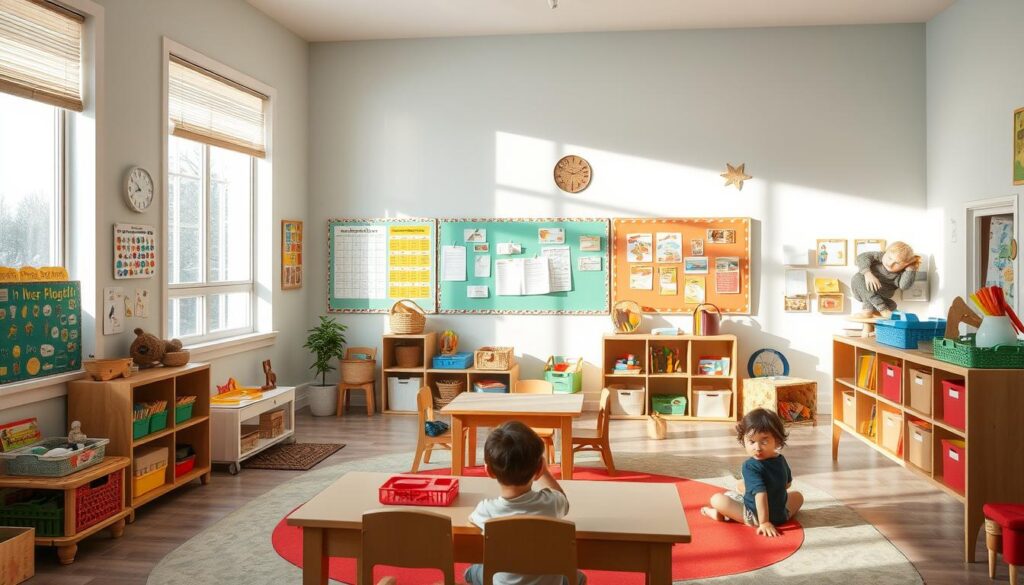Raising a child with special needs is a journey filled with challenges and rewards. It’s crucial to understand the special needs challenges we face. More children need extra support, including those in scouting and sports.
A bad experience in an adapted swimming class showed us the need for flexibility. We must be ready to adapt to meet the diverse needs of these children.
In this article, we’ll look at special needs parenting tips. These tips focus on support strategies and emotional resilience. The Inclusion Basketball League at the Friendship Circle is a great example of positive support and practical accommodations.
By being consistent, using tailored cues, and having plans, we can help our children and ourselves succeed. Maintaining a positive attitude is also key. It can greatly improve our children’s experiences and outcomes.
Let’s start this journey with the goal of creating an inclusive environment. We want to celebrate each child’s strengths and support their challenges.
Key Takeaways
- Understanding the unique challenges of special needs parenting is crucial for effective caregiving.
- Flexibility and common sense are key to accommodating children in various activities.
- Positive attitudes can greatly enhance a child’s experience.
- Consistency in rules fosters inclusivity and support for children with special needs.
- Utilizing assistive technology can improve the quality of life for children.
- Having detailed plans and back-up strategies can alleviate stress in challenging situations.
Welcome to TheRubywadhwa.com
How to Deal with Special Needs Child !
Understanding the Unique Challenges of Raising a Special Needs Child

Raising a special needs child is a big challenge that affects daily life. Parents face emotional hurdles in this journey. Children with conditions like Autism and Bipolar Disorder have special abilities but may struggle with everyday tasks.
Parents become experts on their child’s condition, spending hours researching. This journey can make them feel isolated as they deal with healthcare and schools.
Dealing with a child’s disability brings emotional weight to families. Parents worry about their child’s future care as they get older. They fear finding the right care when they can’t provide it anymore.
Financial stress is common, forcing families to make career sacrifices. This can lower their income and add to the stress.
Social isolation often comes with caregiving. Families may miss out on social activities, affecting their social skills. This can strain marriages, as disagreements on care can lead to conflict.
Getting support from community agencies is key. Support groups offer valuable connections, making parents feel less alone.
There are resources and peer networks to help families. With the right support, families can stay strong and advocate for their children. Understanding these challenges helps us find ways to cope, leading to better outcomes for our families.
| Challenges | Impact on Families |
|---|---|
| Emotional Burden | High levels of stress, anxiety, and grief |
| Financial Strain | Decreased family income due to career sacrifices |
| Social Isolation | Limited social skills development for child and parent |
| Marital Conflict | Strain from differing opinions on child care and priorities |
Strategies for Supporting a Child with Special Needs

Supporting a child with special needs means understanding their unique strengths and challenges. We use effective support techniques tailored to each child’s needs. This includes advocating for customized Individualized Education Plans (IEPs) that focus on their learning style and disabilities.
Parents must be proactive and communicate clearly with educators. Schools may not offer necessary accommodations without a request. Developing strong negotiation skills is key in these situations.
Fostering self-awareness and self-confidence in children with learning disabilities is crucial. Encouraging them to recognize their abilities helps build self-esteem and identity.
Using multi-sensory approaches to learning can greatly benefit a child. Engaging different senses helps with cognitive development and retention. We should focus on their strengths and talents for well-rounded development, not just their disabilities.
| Strategies for Special Needs Children | Benefits |
|---|---|
| Multi-sensory learning | Enhances brain development, accommodates various learning styles |
| Positive reinforcement | Encourages effort, promotes self-esteem |
| Clear communication | Ensures proper accommodations are granted by schools |
| Independence-focused activities | Builds confidence, fosters life skills |
| Individualized Education Plans (IEPs) | Tailors support to meet specific needs |
Supporting a child with special needs requires patience and flexibility. Recognizing each student’s individuality can greatly impact their education. Effective support goes beyond academics, covering social skills, emotional well-being, and forming healthy relationships. Creating an inclusive environment promotes socialization and engagement among all students.
How to Deal with Special Needs Child: Essential Parenting Tips

Caring for a special needs child comes with its own set of challenges. We need to find effective ways to care for them. Having a structured routine is key for both kids and parents. It brings a sense of security and predictability, which is vital for emotional well-being.
Being flexible in our daily activities is also important. It helps us adjust to our child’s changing moods and needs. Planning for calm down periods can make tough times easier. It helps prevent meltdowns and creates a supportive environment.
Keeping a positive outlook is another crucial tip. Being positive not only improves our home atmosphere but also helps our child grow. It also boosts our emotional well-being.
To help parents more, we’ve outlined some key tips and caregiving practices:
| Parenting Tips | Description |
|---|---|
| Structured Routine | Having a daily schedule helps reduce anxiety in special needs children. |
| Flexibility | Being open to changes helps us meet our child’s needs and preferences. |
| Calm Down Planning | Setting aside times or spaces for relaxation helps with smooth transitions. |
| Positive Outlook | Being optimistic creates a supportive environment for emotional growth. |
| Continuous Learning | Learning about special needs improves our understanding and caregiving skills. |
Using these parenting tips can help us manage the challenges of special needs parenting better. These strategies encourage us to grow and adapt with our child. They ensure we meet both our and our child’s needs in this journey of care and support.
Interactions: Tips for Engaging with Your Child
Engaging with a special needs child needs careful and respectful communication. It’s key to build meaningful interactions to make them feel included and understood. Here, we share important interaction tips to improve our connection and avoid common mistakes in special needs parenting.
Importance of Direct Engagement
Direct engagement is crucial when talking to a special needs child. Even if they can’t speak, they know when they’re being talked to. Eye contact and using their name can help a lot in making a connection. We should always be fully present and acknowledge their feelings.
Some children with disabilities might not look different. This can lead to wrong assumptions. Being empathetic helps us better understand their needs and improve our communication.
How to Avoid Common Mistakes
We should avoid using baby talk when talking to special needs children. It makes them seem childish and can lower their self-esteem. Using proper language shows respect and recognizes their intelligence.
It’s also wrong to assume what a child can do based on their disability. Many children with special needs are smarter than we think. Being open to their abilities leads to better interactions. We should also show inclusive behavior and teach others to accept and befriend children with disabilities.
Observing and Understanding Your Child’s Behavior
Understanding special needs children’s behavior is key to knowing their emotional and physical health. It shows that their actions can be a way to communicate, especially when they can’t speak. By paying close attention and understanding their signals, we can help them feel better.
Behavior as Communication
Behavior can tell us a lot about what a child needs. For kids with special needs, actions like frustration or withdrawal might mean they can’t express their feelings. Seeing these actions as a way to communicate helps us support them better. We can then teach them positive behaviors and discourage negative ones.
Recognizing Sensory Overload
It’s also important to spot when a child is feeling too much from their surroundings. This feeling, called sensory overload, can lead to hard behaviors. We need to watch for signs like agitation or meltdowns. Using the CSEFEL Pyramid Model can help us understand these behaviors better in school.
To deal with sensory overload, making plans that fit each child’s needs is helpful. Working with therapists can give us specific ways to help. It’s also key to talk with teachers and caregivers to make sure we’re all helping the child grow emotionally and socially.
| Behavior Type | Possible Interpretation | Recommended Response |
|---|---|---|
| Withdrawal | Overwhelmed by sensory input | Create a calming space and reduce stimuli |
| Frustration | Difficulty in expressing needs | Ask open-ended questions to encourage communication |
| Meltdowns | Overstressed or anxious | Provide consistent routines and soothing techniques |
| Aggression | Struggling with emotional regulation | Teach coping strategies and reinforce positive behaviors |
By noticing these signs and using supportive actions, we can create a better environment. This helps our child’s behavior and growth in many ways.
Managing Emotional Stress in Special Needs Parenting
Managing emotional stress is key in special needs parenting. We face many emotional challenges, like guilt, anxiety, and sadness about our child’s condition. It’s important to recognize these feelings and find ways to cope. Taking care of ourselves helps us stay emotionally healthy and balance our responsibilities.
Dealing with Difficult Emotions
Many parents feel isolated, overwhelmed, or guilty about their child’s challenges. This can lead to high stress levels, shown by certain biomarkers. Getting help from support groups, therapy, or counseling can boost our emotional strength. Mindfulness techniques can also help reduce anxiety and improve our emotional state.
Maintaining Other Responsibilities
It can be tough to balance responsibilities in special needs parenting. We often put our child’s needs first, leaving us feeling exhausted and neglecting our own well-being. Using respite care services can give us much-needed breaks. Connecting with understanding healthcare providers and joining support groups can also help manage daily stresses.
| Source of Stress | Impact on Parents | Suggested Strategies |
|---|---|---|
| Feeling isolated | Increased feelings of anxiety and depression | Join support groups |
| Overwhelmed by therapies | Physical and mental exhaustion | Set realistic goals |
| Guilt about child’s disability | Self-doubt and guilt | Participate in therapy sessions |
| Anxiety about child’s future | Increased stress levels | Focus on education and advocacy |
| Family friction | Strain on relationships | Prioritize family communication |
Caring for Children with Disabilities: Techniques and Tools
Caring for children with disabilities needs a careful plan. It’s all about communication, fun, and keeping their feelings safe. Using special techniques and tools can really help. A daily routine can make a big difference, giving them a sense of security and what to expect.
Using Visual, Auditory, or Tactile Cues
Visual, auditory, and tactile cues are great for kids with special needs. They help remember things and understand better. Here are some ways to use them:
- Visual schedules show what’s happening each day, helping them get the routine.
- Color-coded charts make it easy to see what’s next or how they’re feeling.
- Auditory signals like timers help them know when it’s time to move on.
- Tactile symbols are something they can hold, linking to specific tasks.
These cues help kids feel more in control and less anxious. A regular daily plan makes them feel safe and ready to learn.
Assistive Technology for Communication and Engagement
Assistive technology is key for kids with disabilities to talk and connect. There are many tools for different needs:
| Tool | Purpose | Example |
|---|---|---|
| Speech-generating devices | Help them talk | Dynavox |
| Picture Exchange Communication Systems (PECS) | Use pictures to talk | PECS kit |
| Mobile apps | Make talking fun | Proloquo2Go |
| Sensory integration tools | Help them focus | Sensory mats |
These tools help kids talk and play with others. Knowing what each child needs and using the right tools can make a big difference. It helps them do well in their world.
Advocating for Your Child’s Needs
Advocating for a special needs child means talking well with caregivers and teachers. As parents, we shape our child’s school life. Working with schools can boost social skills, attendance, and grades.
Being involved leads to deeper talks about our child’s progress and needs.
Effective Communication with Caregivers and Educators
Building a strong bond with the school team is key. We are part of our child’s IEP team, helping their education journey. Ways to engage include:
- Asking for IEP meetings to talk about changes.
- Knowing the law’s timelines for checks and tests.
- Keeping records of talks with the school.
Knowing our rights under ADA and IDEA helps us advocate better. Seeking services shows we care about our child’s needs.
Identifying Support Resources
Support groups for families boost our advocacy. Sharing experiences and tips creates a supportive space. Useful strategies include:
- Talking to local lawmakers about our child’s needs.
- Getting help from therapists who know special needs.
- Keeping up with disability rights laws.
Teaching our kids to advocate for themselves builds their confidence. Staying calm and focused helps achieve better results. Getting support from others strengthens our advocacy and ensures our kids get the education they need.
Building a Support Network for Special Needs Families
Creating a strong support network for special needs families can change lives. Talking with others who understand us brings comfort and valuable help. Support groups for caregiving are places where parents can share and learn from each other.
We get advice from teachers, doctors, and other parents. This helps us understand and meet our children’s special needs better.
Exploring Support Groups and Resources
Being part of a support group lets us talk openly about our challenges. These meetings often include experts like therapists and teachers. They lead discussions that help us feel less alone.
Even small groups can offer a lot of support. They provide information on medical and educational services. This makes it easier to find help for our children.
Sharing Your Knowledge with Others
Our experiences are precious in the special needs community. By sharing what we know, we help others and learn more ourselves. Social media is a great place to connect with other families.
This sharing creates a strong, supportive community. Organizations like the National Autistic Society and the Special Needs Parents Association offer local support. They help us grow our networks.
| Support Group Type | Focus | Benefits |
|---|---|---|
| Local Community Groups | Emotional Support | Reduce feelings of isolation |
| Online Forums | Information Sharing | Access to diverse resources |
| Professional-led Meetings | Guidance and Training | Access to expert advice |
By creating a diverse support network, we improve our journey as special needs parents. Sharing and learning from each other builds a strong community. This community makes a big difference in our lives.
Conclusion
Dealing with a special needs child means we need to take a wide view. We must focus on understanding, being strong, and always supporting them. This article has shown us key ways to care for our children with special needs.
We’ve learned how to face the challenges and fight for our kids’ rights and education. By doing this, we help our children and make our communities stronger.
Raising a child with disabilities can be a tough emotional journey. Parents often feel shocked and unsure at first. But, these experiences can also help us grow personally.
Using early intervention services and Individualized Family Service Plans (IFSPs) can give us the tools to help our kids succeed. This way, we can support them in their growth.
Remember, the journey of special needs caregiving is easier with support from others. By sharing our experiences, we create a space of empathy and understanding. Together, we celebrate our children’s achievements and fight for their rights.
FAQ
What are some effective strategies for supporting a special needs child?
Understanding the child’s unique abilities is key. Adapt interactions to fit their communication style. Positive reinforcement helps a lot. Creating a supportive environment is crucial for their development.
How can we manage the emotional stress of parenting a child with special needs?
It’s important to recognize feelings of guilt, anxiety, and grief. Using therapy, mindfulness, and self-care can help. These actions improve emotional well-being and caregiving.
What are the best practices for engaging with a special needs child?
Directly engaging with the child is best. Use their preferred communication methods. Avoid baby talk to show respect. Paying attention to their cues leads to meaningful interactions.
How can we effectively advocate for our child’s needs in educational settings?
Clear communication with educators is crucial. Knowing about support resources helps too. This knowledge strengthens advocacy efforts.
What resources are available for parents of special needs children?
Many resources exist, like local groups and online communities. They offer information, support, and tools for caregiving.
How can we create a structured routine that accommodates a child’s needs?
Creating a routine is important but must be flexible. Plan for transitions and use calming activities. This helps the child’s health and emotional well-being at home.
What role does behavior play in communication for special needs children?
A child’s behavior often communicates their needs, especially for non-verbal ones. Observing behaviors helps provide the right support.
What techniques can be used to enhance communication with children who have disabilities?
Visual, auditory, and tactile cues help. Assistive technology also aids in expressing needs and participating in activities.
How can parents of special needs children build a support network?
Joining support groups and connecting with other families is helpful. Sharing experiences builds community resilience and offers learning opportunities.